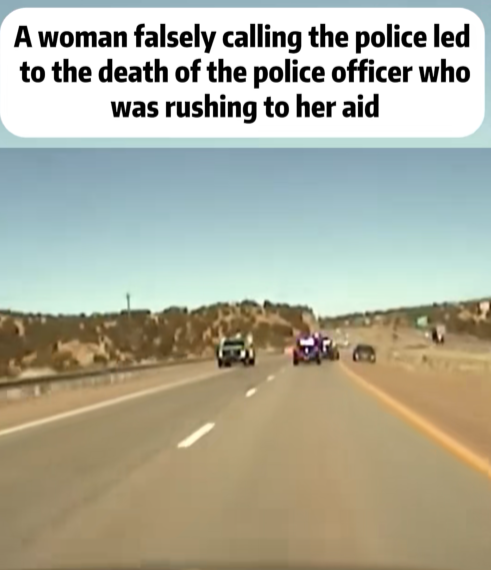“False Emergency Call Leads to Tragic Crash — Officer Loses His Life While Rushing to Help Woman Who Didn’t Need Assistance”
A heartbreaking and deeply troubling incident is gaining widespread attention after dashcam footage revealed the tragic chain reaction caused by a woman who allegedly made a false emergency call, leading to the death of a police officer who was speeding to assist her.
The video, recorded from a patrol vehicle on a long stretch of highway, shows the final moments of a desperate response. Lights flash, sirens blare, and multiple units race down the interstate at high speed. Officers believed a woman was in immediate danger — a life-or-death situation that required urgent response.
But according to reports circulating online, the call turned out to be false, and the emergency was never real.
The footage captures the devastating aftermath: squad cars blocking the roadway, debris scattered, and officers rushing toward a crashed patrol vehicle. The responding officer, who was attempting to reach the caller as fast as possible, reportedly lost control while navigating traffic. Despite immediate aid from fellow officers and emergency crews, the injuries were fatal.
The tragedy has sparked an emotional wave across social media.
Online commenters are expressing grief and outrage:
- “This was completely avoidable. A fake emergency cost a real life.”
- “People don’t understand the weight of calling 911 — it’s not a joke.”
- “That officer was doing his job, trying to save someone.”
- “This is heartbreaking for his family and the department.”
Emergency dispatchers emphasize that false calls, even when not malicious, have real consequences. Police, firefighters, and paramedics push themselves physically and mentally every time they respond. High-speed travel under pressure is inherently dangerous, and false alarms create unnecessary risk.
Experts point out that 911 misuse — whether due to panic, miscommunication, or intentional deception — strains resources, diverts responders from real emergencies, and can lead to outcomes like this one. In many regions, knowingly making a false emergency report is a criminal offense, because the potential harm extends far beyond inconvenience.
Authorities are still investigating the circumstances behind the woman’s call. Early reports suggest she may not have intended to cause harm; she may have exaggerated a situation, misunderstood what was happening, or made the call impulsively out of fear or confusion. Even so, investigators are reviewing whether charges should be filed.
The fallen officer, whose name has not been released publicly in circulating reports, was described by colleagues as dedicated, compassionate, and always willing to answer a call for help — no matter the risk. His death has left a void in his department and community, with vigils and memorial posts appearing online.
This tragedy is prompting an urgent discussion about responsible emergency reporting. Many viewers are now sharing reminders:
- Only call 911 for genuine emergencies.
- Stay calm and give accurate information.
- Understand the gravity of requesting emergency response.
One of the most repeated comments captures the sentiment felt across the internet:
“Someone cried wolf — and a hero paid the price.”
